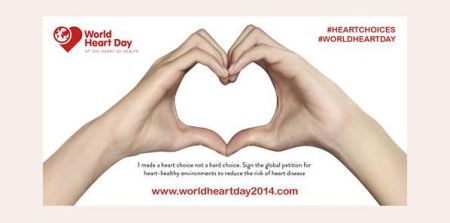Heart disease is the leading cause of death worldwide, but it doesn’t have to be. Reflecting on the World Heart Day theme, creating heart-healthy environments, ESC spokesperson Professor Stephan Gielen Halle, Germany pointed out that there are more cases of cardiovascular disease in India and China than in all developed countries together.
“There has been a steady increase in metabolic and cardiovascular disease around the globe and while treatment is helpful, prevention is the best way to reverse this trend,” said Prof. Gielen, who is the past President of the European Association for Cardiovascular Prevention & Rehabilitation (EACPR). He suggests that countries focus on educating people about healthier diets and the dangers of sedentary lifestyles.
“Simple lifestyle changes can dramatically reduce the risk of prematurely dying from cardiovascular disease,” he said. “This World Heart Day, try something new; take a Tai-Chi class, walk up a flight of stairs instead of taking a lift or go for a long walk.”
ESC spokesperson Professor Pedro Marques-Vidal said the answer to a healthier heart can be found by simply looking down. “There is a transportation system that is available on demand 24 hours a day, seven days a week. It is inexpensive, does not pollute the environment and is perfect for going short distances,” said Prof. Marques-Vidal, from Lausanne, Switzerland. “This outstanding and extremely sophisticated system is called the feet. Walking is the easiest way to exercise and improve your heart health, and it also has considerable environmental benefits. In heavily populated cities improving pedestrian walkways could decrease pollution and increase quality of life. Make a difference this World Heart Day by using your legs to get around your town.”
ESC spokesperson Doctor Sania Nishtar from Islamabad, Pakistan agreed, saying “healthy diet and physical activity are tickets to a longer healthier life; science, policy and the market must converge to ensure that their benefits have universal outreach.
“We should make a conscious effort to create an enabling environment in homes and workplaces so that physical activity and a healthy diet get woven in the fabric of our daily lives and the societal culture,” she continued. “Responsive public policy is key to this change, but we have to be cognizant that polices are shaped by public demand; hence the role of individual awareness and action should not be under-estimated.”
While pushing for policy change might be out of the reach for some, shopping locally and leaving vehicles behind is not. “In most places today, it is possible to eat exotic foods that have arrived by plane from distant countries,” said Prof. Marques-Vidal. “Consuming foods produced locally and according to seasons is healthier and saves money and the environment, while favouring local producers and the local economy. This is called solidarity.”
This World Heart Day: Focus on prevention Leave your car at home and walk to work; ride your bicycle to the park; walk a few blocks to take public transportation and visit a local market for some fresh vegetables. You will be making your heart and the world a little healthier.
Source: European Society of Cardiology
“There has been a steady increase in metabolic and cardiovascular disease around the globe and while treatment is helpful, prevention is the best way to reverse this trend,” said Prof. Gielen, who is the past President of the European Association for Cardiovascular Prevention & Rehabilitation (EACPR). He suggests that countries focus on educating people about healthier diets and the dangers of sedentary lifestyles.
“Simple lifestyle changes can dramatically reduce the risk of prematurely dying from cardiovascular disease,” he said. “This World Heart Day, try something new; take a Tai-Chi class, walk up a flight of stairs instead of taking a lift or go for a long walk.”
ESC spokesperson Professor Pedro Marques-Vidal said the answer to a healthier heart can be found by simply looking down. “There is a transportation system that is available on demand 24 hours a day, seven days a week. It is inexpensive, does not pollute the environment and is perfect for going short distances,” said Prof. Marques-Vidal, from Lausanne, Switzerland. “This outstanding and extremely sophisticated system is called the feet. Walking is the easiest way to exercise and improve your heart health, and it also has considerable environmental benefits. In heavily populated cities improving pedestrian walkways could decrease pollution and increase quality of life. Make a difference this World Heart Day by using your legs to get around your town.”
ESC spokesperson Doctor Sania Nishtar from Islamabad, Pakistan agreed, saying “healthy diet and physical activity are tickets to a longer healthier life; science, policy and the market must converge to ensure that their benefits have universal outreach.
“We should make a conscious effort to create an enabling environment in homes and workplaces so that physical activity and a healthy diet get woven in the fabric of our daily lives and the societal culture,” she continued. “Responsive public policy is key to this change, but we have to be cognizant that polices are shaped by public demand; hence the role of individual awareness and action should not be under-estimated.”
While pushing for policy change might be out of the reach for some, shopping locally and leaving vehicles behind is not. “In most places today, it is possible to eat exotic foods that have arrived by plane from distant countries,” said Prof. Marques-Vidal. “Consuming foods produced locally and according to seasons is healthier and saves money and the environment, while favouring local producers and the local economy. This is called solidarity.”
This World Heart Day: Focus on prevention Leave your car at home and walk to work; ride your bicycle to the park; walk a few blocks to take public transportation and visit a local market for some fresh vegetables. You will be making your heart and the world a little healthier.
Source: European Society of Cardiology
Latest Articles
Heart disease is the leading cause of death worldwide, but it doesn’t have to be. Reflecting on the World Heart Day theme, creating heart-healthy environ...























